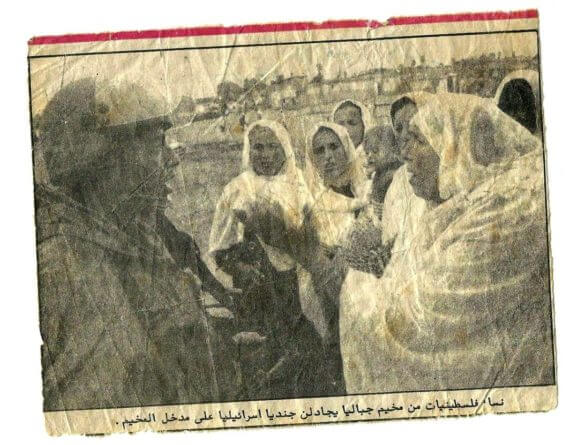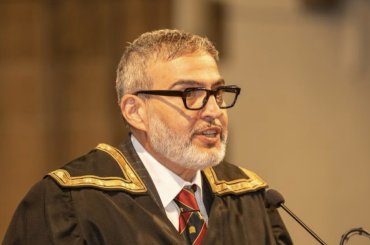I was born in Jabalia refugee camp which is the biggest in the Gaza Strip. It is the camp where most of the civic disobedience and “intifada” has emerged. As a woman, I consider that my luck was by my side when my family decided to move to the city at the age of two years. But I consider and identify myself as a woman from the camp because the camp spirit, characterized by resilience, strength and determination, is rooted into my personality.
Jabalia refugee camp where 176,268 people ‘mostly identified as refugees’ live in an area of 1.4 km² making it one of the most densely populated places on earth. These unique characteristics are consequences of the occupation. Also, people in Jabalia refugee camp and other areas of Gaza live very closely to each other which resulted in the social unity among Gazans. However, it also in some ways dismissed the agency of a person’s individuality as well as turned our society into a more conservative one.
You may be wondering now why I am sharing this information with you. As a woman raised in Gaza, I acknowledge and consider that the struggles I have been through because of my gender is simply a consequence of the settler colonization of our Palestinian homelands which forced us to spend our lives living in camps, with no basic rights but only with attempts to remain steadfast and keep the hope of returning one day to our occupied lands. I remember the nights in which my grandmother used to tell us how they were living peacefully in their small house in our currently occupied village of Beit Jirja. She used to tell us how men and women of the village used to gather themselves to go to their fields to plant olive trees, water and harvest them. Also how their weddings were much more beautiful than contemporary weddings, where men and women stand up in lines, holding each other hands and dancing dabke while singing. The social organization of Palestine has been dramatically changing since Israel decided to establish its state on our lands. With Israel’s continuous human rights violations, constantly launched massive military attacks against Palestinians and imposed siege on Gaza making it as the largest-open-air prison in the world, the Palestinian society has been turning into a close-minded and patriarchal society. Therefore, it is important to bear in my mind how Israel’s colonization policies and its impacts on the redistribution of power, has affected the self definitions and social interactions between Palestinian men and women.

I recently participated in a feminist summer camp “AGORA” organized by the European Women’s lobby in Brussels. I definitely was thrilled and lucky enough to be surrounded by intersectional feminists from all over Europe. However, being the only Palestinian participant in the camp gives me responsibility to address issues that mostly the feminist movement in the West neglects or doesn’t give it enough attention. During a group activity, we were asked to think about how we want the feminist movement in Europe to be. The first need came to my mind was it has to be post-colonial and therefore de-colonial. Some of the participants didn’t understand what that even means. Simply explaining, mainstream feminism oversimplifies women struggles from formerly or currently colonized countries. They believe that the movement is a resistance solely against sexist oppression. This, thereby, turns a blind eye and excludes other main colonial and imperial factors that play a huge role in the hardships women of color or “Third World” women go through.
If Israel didn’t decide to establish its state on the Palestinian lands, Palestinians regardless of gender would have kept enjoying their simple life. Palestinian women wouldn’t have to go through the objectification of their bodies which are used as a battle field in many spheres. For instance; during interrogation in the Israeli jails. Many Palestinian female prisoners wouldn’t have to experience sexual harassment and exploitation by interrogators. Women bodies wouldn’t be used as a tool of pressure during male political prisoners’ interrogation period. Pregnant women wouldn’t have gone through the humiliation of giving birth on checkpoints. Mothers wouldn’t have to mourn their children, husband, friends and relatives. My grandmother wouldn’t have to fight an Israeli soldier in the first intifada who prevented her from visiting her sick husband. My mum wouldn’t have to give birth to three of my siblings while my dad was in the Israeli jails. My sister Shahd wouldn’t be deprived from being breastfed, since the Israeli army attacked our house in 1991 to arrest dad. Mum’s sorrow ended her lactation. I, myself, wouldn’t have to seek asylum in another country because of settler colonization that produced a sick patriarchal organization in my society, stole our resources, and deprive us from our basic rights. Palestinians wouldn’t have to go through the process of healing the inter-generational traumas. I can go on listing non-stop.
An inclusive and intersectional feminist movement should address the struggles of women in different contexts. It should also acknowledge that there are huge gaps of privileges between women in the West and in the East. It shouldn’t ignore the long-lasting impacts of colonization on women from colonized countries. It should understand that an inclusive movement would never be successful without acknowledging the main colonial, imperial and capitalist elements, differently shaping women experiences. There is hope but we have always to keep on calling for a diverse, inclusive, de-colonial and intersectional feminist movement.



“An inclusive and intersectional feminist movement should address the struggles of women in different contexts”
It’s not as if every son of David is ignorant of that,
“I am the offspring of David black is the colour of my skin…”
https://youtu.be/H9vjL-PCra8?t=1s
Romans mocked Jesus as “King of the Jews”.
There was no Palestine in the first century AD. But there was Roman occupation of the kingdom of Judea and Jesus with his disciples was fighting for Jewish liberation.
“…the Palestinian society has been turning into a close-minded and patriarchal society”. Well, this grievance is certainly a new one, but the style of presenting the anti-Israel case in Mondoweiss remains the very same. It’s obvious that the author (in claiming that the founding of Israel has ended the ideal life that existed before 1948) is hinting that the ending of Israel is the only solution. Surely, the use of the term “de-colonization” is meant to bring home the idea that the undoing of Israel is the only agenda. But, as always, this goal is never stated in clear language. One can always deny that the agenda is the demise of Israel, because nowhere will it be stated.
“Nowhere will it be stated” but everywhere it’ll be dog-whistled. It’s a convenient way of avoiding the need to confront Palestinianism as nationhood by negation of the other’s nationhood, of subtly endorsing of epitomic terrorism, of giving Diaspora Jews a platform with which to articulate their fear of Jewishness-as-nationhood instead of (non-observed) religion, and of verbally gunning down any person, act, or idea that might move the conflict toward a settlement. It gives comfort and satisfaction to those who intersectionalize the good old days of Stalinist antisemitism with today’s armchair progressive chic.